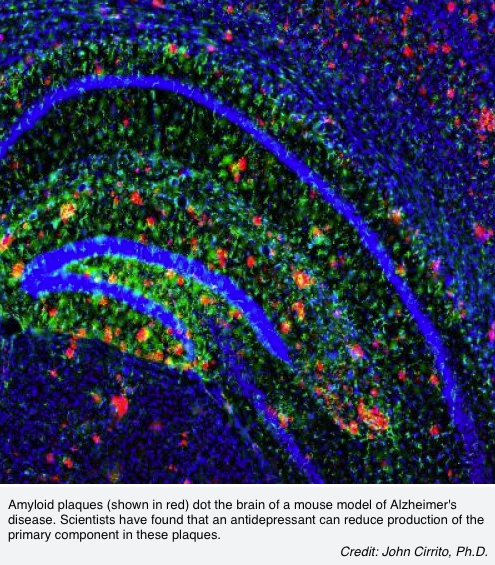 A commonly prescribed antidepressant can reduce production of the main ingredient in Alzheimer’s brain plaques, according to new research at Washington University School of Medicine in St. Louis and the University of Pennsylvania.
A commonly prescribed antidepressant can reduce production of the main ingredient in Alzheimer’s brain plaques, according to new research at Washington University School of Medicine in St. Louis and the University of Pennsylvania.
The findings, in mice and people, are published May 14 in Science Translational Medicine. They support preliminary mouse studies that evaluated a variety of antidepressants.
Brain plaques are tied closely to memory problems and other cognitive impairments caused by Alzheimer’s disease. Stopping plaque buildup may halt the disastrous mental decline caused by the disorder.
The scientists found that the antidepressant Citalopram stopped the growth of plaques in a mouse model of Alzheimer’s disease. And in young adults who were cognitively healthy, a single dose of the antidepressant lowered by 37 percent the production of amyloid beta, the primary ingredient in plaques.
Although the findings are encouraging, the scientists caution that it would be premature for people to take antidepressants solely to slow the development of Alzheimer’s disease.
“Antidepressants appear to be significantly reducing amyloid beta production, and that’s exciting,” said senior author John Cirrito, PhD, assistant professor of neurology at Washington University. “But while antidepressants generally are well tolerated, they have risks and side effects. Until we can more definitively prove that these drugs help slow or stop Alzheimer’s in humans, the risks aren’t worth it. There is still much more work to do.”
Amyloid beta is a protein produced by normal brain activity. Levels of this protein rise in the brains of patients with Alzheimer’s, causing it to clump together into plaques. Plaques also are sometimes present in cognitively normal brains.
Cirrito’s earlier research had shown that serotonin, a chemical messenger in the brain, reduces amyloid beta production. First author Yvette Sheline, MD, also has linked treatment with antidepressants to reduced plaque levels in cognitively healthy individuals.
Most antidepressants keep serotonin circulating in the brain, so this led Cirrito and Sheline to wonder whether the drugs block the increase of amyloid beta levels and slow the progression of Alzheimer’s.
In 2011, the researchers tested several antidepressants in young mice genetically altered to develop Alzheimer’s disease as they aged. In these mice, which had not yet developed brain plaques, antidepressants reduced amyloid beta production by an average of 25 percent after 24 hours.
For the new study, the team gave citalopram to older mice with brain plaques. Jin-Moo Lee, MD, PhD, professor of neurology, used a technique called two-photon imaging to track the growth of Alzheimer’s-like plaques in the mice for 28 days. Giving the mice the antidepressant stopped the growth of existing plaques and reduced the formation of new plaques by 78 percent.
In a second experiment, the scientists gave a single dose of citalopram to 23 people ages 18 to 50 who were not cognitively impaired or depressed. Samples of spinal fluid taken from the participants over the next 24 hours showed a 37 percent drop in amyloid beta production.
Now the researchers are trying to learn the molecular details of how serotonin affects amyloid beta production in mouse models.
“We also plan to study older adults who will be treated for two weeks with antidepressants,” said Sheline, who is now at the University of Pennsylvannia. “If we see a drop in levels of amyloid beta in their spinal fluid after two weeks, then we will know that this beneficial reduction in amyloid beta is sustainable.”
Source: Washington University in St. Louis. “Antidepressant may slow Alzheimer’s disease.” ScienceDaily. www.sciencedaily.com/releases/2014/05/140514142326.htm (accessed May 15, 2014).














